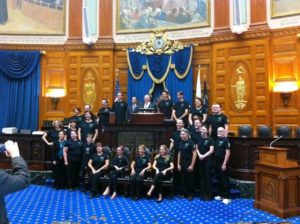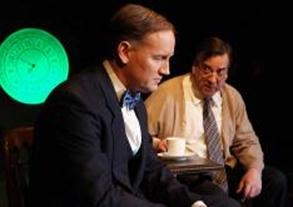The Burlington Players of Burlington, Mass., took a trip to the State House in Boston July 26 as guests of the Massachusetts Legislature. The occasion: The community theatre troupe had walked off with the highest prize in its field a month before—Best Show Award at the 2013 American Association for Community Theatre (AACT) annual festival on June 23. The play was RADIUM GIRLS, and the accomplishment was singular in a number of ways.

Director Celia Couture tells me this event marked the first time in 20 years that any Eastern Massachusetts company had won the top award at AACT. Not only that, to get to the competition in Carmel, Indiana, the all volunteer cast and crew of 27 had to raise $44,0000 to cover the costs of travel, housing, and conference fees, as well as shipping sets, costumes, and props required to perform their 60 minute cutting of my play. That figure, she notes, is a number of times greater than the actual production budget for the full-length play in 2011, which Burlington had produced to wide acclaim. The success of that production prompted the company to take the play to state and regional competitions.
The day the competition production won the nationals, my in-box on Facebook was aflutter with excited messages from cast members who’d friended me months earlier, to let me know of their triumph and thank me again for the script.
By the various accounts I’ve heard, competition at AACT was fierce—Radium Girls received more nominations than any other production—out of 12 shows in the festival—-including best actor and best director— and placed in none, until the final moment, when the award for best show was announced at the Saturday night ceremony that concluded the week.

The company’s triumph offers a lot to reflect on, considering my initial reluctance to approve a cut-down version for competition. I’m accustomed to these requests, but invariably they come from high schools and the understanding usually is that what is presented is a selection of scenes. But for some reason I agreed to the cuts Celia proposed, and the result has been to create an opportunity for another troupe of artists to carry on with a play they had fallen in love with. And it is not an easy script. I still believe the play requires a smart, firm director to move it and keep it on point – if I could do it over, I think I’d reshape the first act—but even the weakest productions I’ve seen over the years have managed to convey the strength of the story itself. It says something that Radium Girls is approaching 300 productions since its premiere at Playwrights Theatre of New Jersey more than a decade ago. And I’m continually amazed at the fierce devotion it seems to inspire in the actors and directors who’ve undertaken the challenge.
One of the most eloquent testimonials to the play was posted by Burlington cast member Nick Bennett-Zendzian. The night of the big win he wrote this on his Facebook page:
All of my theatre friends (which would be most of you) know that feeling of finality that comes with the closing performance of a show you’ve been working on. There’s the realization that each moment you are having on stage that night is the last time you will ever experience that particular moment. You think of the months you spent working on that scene, and then once it’s over, that scene is done, and you’re not going to be visiting it again. It’s a very bittersweet feeling. … It’s come to the point where I literally cannot imagine my life without any of these people. From the moment we were all cast, we clicked. We celebrated each other’s triumphs, and worked together to overcome the difficulties we faced on the journey. … It was a shining example of what theatre is supposed to be, and has become the standard I will use to measure the success of all the shows I do in the future. … This show has changed me for the better, and I will always, *always* be grateful for that experience.
In playwriting, we often measure our successes in the number and status of productions, thinking that if we aren’t produced at big LORT theatres, if we can’t get an agent, don’t see our work celebrated in American Theatre, can’t get the lit manager of the small storefront company to call us back—then our work has no value. We forget how very individual responses are to the plays we write. The fact is, the work is out there, and when any company takes it up and embraces it the way this company embraced Radium Girls, the result is transformative—not just for the audiences that see the play, but for the actors and other artists that work on it.
I never met any of the folks involved in the Burlington show – but they have reached out to me, and I’m grateful that they thought to bring me into the loop to share their progress, frustrations, and ultimate triumph with the play. I’m many years removed from the struggle of writing it, but these kinds of experiences restore my sense of balance. Success is not always measured in the ways we think it ought to be, but we are not always in control of our theatrical fortunes. I don’t know why professional theatre never embraced the play — well I do know why, it’s the cast size — but the fact that Radium Girls has had a long life in the amateur market is an amazing thing to me. I’ve written before of the psychic rewards of hearing from excited actors who worked on a successful production. But it’s good to be reminded again of what that all means.
Radium Girls took three years of my life; it was the result of a long-time obsession, and I think the fact that I poured my heart and soul into it is reflected in its pages. That the play has been a vehicle for the artistic triumphs and personal growth of other artists around the country is a gratifying realization. It shows that when we sit down to write, we can never know what impact our efforts will have in the end, but above all else, it is important to have faith in ourselves and soldier on; if we believe strongly in the work, and if we are brave enough to invest our hearts in it, then it will find its place in the world somehow and its meaning will be deeply felt.
Thanks for the Burlington crew for allowing me to learn this lesson once again.
